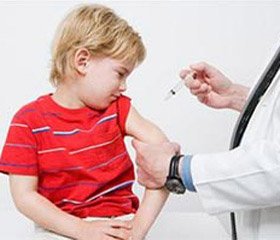Журнал «Здоровье ребенка» 1 (60) 2015
Вернуться к номеру
Monitoring results of bcg vaccination complications
Авторы: Lyepshina S.M. - M. Gorky Donetsk National Medical University; Skripka L.V. - State Institution "Donetsk Regional Laboratory Center; Tyshchenko Ye.V, Skripka N.S., Yurovskaya Ye.I. - M. Gorky Donetsk National Medical University; State Sanitary-Epidemiological Service in Ukraine"
Рубрики: Педиатрия/Неонатология
Разделы: Клинические исследования
Версия для печати
Epidemiological situation on tuberculosis in Ukraine remains rather complicated. According to WHO experts the main components of the tuberculosis control program are detection of TB patients and vaccination against TB. BCG vaccination has been recognized in many countries of the world. It is compulsory in 64 countries, officially recommended in 118. The vaccination is done for approximately 2 billion people. It prevents the development of severe forms of disease associated with hematogenous spreading of Mycobacterium tuberculosis.
TB vaccine consists of live attenuated strain of Mycobacterium bovis. Its ability to intracellular multiplication leads to the possibility of complications after immunization (0.04 - 4%). BCG complications are diagnosed at different terms from the moment of vaccination.
BCG and BCG-M vaccines (strain BCG-1, Russian Federation) are used in Ukraine for a long time. Considering the importance and the necessity of TB immunization in condition of tuberculosis epidemic, the Ministry of Health of Ukraine had decided to implement the TB vaccine BCG SSI (Statens Serum Institut) that was manufactured in Serologic State Institute (Denmark).
For four years (2008-2012) vaccination against tuberculosis was carried out by BCG vaccines of different strains composition and different manufacturers: SSI (Denmark), “Medgamal” of Research Institute of Epidemiology and Microbiology named after NF Gamaleya of Russian Academy of Medical Sciences (Russian Federation), Federal State Unitary Enterprise “Scientific-Production Association “Microgen” of Ministry of Health and Social Development (Russian Federation). We have studied the monitoring results of complications after immunization with BCG vaccine in the Donetsk region in 2004-2013.
The aim of work was to study the number and nature of complications after BCG vaccination in the Donetsk region for two periods: 2004-2007 and 2008-2013.
Materials and Methods
It was used materials of inquiry of 1004 cases of complications after BCG vaccination which were provided by specialists of medical institutions and sanitary- epidemiological services of region, generalized data of post-vaccine reactions and complications after vaccination (reports 2004-2013), generalized data on performance of preventive vaccination from computer program “UkrVac” (reports 2004-2013). Complications of BCG vaccination are defined according to the Order of the Ministry of Health of Ukraine from 16/09/2011 # 595 “About the order of conduction of preventive vaccination in Ukraine and control of quality and usage of medical іmmunobіologіcal medicines”. The material is processed by methods of variation statistics.
Results
On average about 40,000 newborns are vaccinated by BCG vaccine in the region every year. Post-vaccine complications are recorded annually. In the first four years of observation post-vaccine complications did not exceed 0.09%. Since 2008, when BCG SSI (production Denmark) was mainly used, significant growth of complications (by 0.14%) had been registered . Monitoring visits to hospitals performing BCG vaccination of newborns and children were carried out in order to check the quality of vaccination. It was found that the technique of vaccination was broken in 36 cases. A year later, the number of complications has increased by 2 times.. In 2011 the amount of complications reached 0.62%. Order of the Ministry of Health of Ukraine from 22/06/2011 # 371 “About approval of use of BCG vaccination for newborns” canceled order of the Ministry of Health of Ukraine from 07/07/2008 # 366 “About approval of the program of transition to the TB vaccination by BCG SSI (Danish strain) in Ukraine”. In 2013 rate of complications was decreased to 52 (0.14%), p<0.001, as a result of refusal of BCG vaccine of Danish production.
We have studied the character of complications as well.The highest amount of complications was recorded in the form of regional lymphadenitis: 789 (0.4%) cases after applying of BCG SSI (Denmark), 31 (0.07%) cases – after vaccination by BCG vaccine made by Federal State Unitary Enterprise “Scientific-Production Association “Microgen” (Russian Federation), 4 (0.01%) – after vaccination by BCG vaccine made by “Medgamal” of Research Institute of Epidemiology and Microbiology named after NF Gamaleya (Russian Federation).
In general, vaccination technique was broken in 56 cases. In 2 (0.0004%) cases it was the cause of the superficial ulcer after application of BCG vaccine made by Federal State Unitary Enterprise “Scientific-Production Association “Microgen” (Russian Federation) and SSI (Denmark), in 54 (0.04%) – subcutaneous cold abscesses (including 25 after vaccination with BCG vaccine made by SSI (Denmark), 28 – after BCG vaccine made by Federal State Unitary Enterprise “Scientific-Production Association “Microgen” (Russian Federation), 1 – after using BCG vaccine made by “Medgamal” of Research Institute of Epidemiology and Microbiology named after NF Gamaleya (Russian Federation). 26 cases of BCG-associated osteitis were registered, including 2 cases after vaccination by BCG vaccine made by SSI (Denmark).
Thus, during the follow-up period lymphadenitis prevailed (80%) among post-vaccine complications; cold abscesses was diagnosed in 20% of cases. Superficial ulcer was noted in a few cases in 2005, 2008, and 2010.
In 2008 first cases of BCG osteitis was reported after BCG vaccine made in Russian Federation. Previously, such cases were considered as tuberculosis of bones.
All children with post-vaccine complications received chemotherapy with 1st line anti-TB drugs, excluding pyrazinamide.. Surgical treatment was administered for cold abscess, local treatment – for superficial ulcer.
Conclusions:
Lymphadenitis prevailed in the structure of complications after BCG vaccination regardless of the type of vaccine. Growth of complications from 0.09% to 0.6% associated with the use of BCG of Danish production, cases of BCG osteitis was marked after vaccination with BCG vaccine of Russian production.

